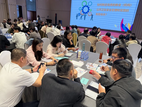Blurred boundaries are often the root of conflict in modern families, workplaces, and interpersonal relationships. Pastor Li, an experienced counselor in northern China, observed that much suffering arises from "crossing boundaries," such as parental overreach, leaders assuming absolute authority, and blurred responsibilities in relationships. Drawing from years of ministry experience, he stressed that a sense of boundaries is not only essential for mental health but also reflects religious humility.
Boundary Awareness as Humility
"Life often suffers because we cross boundaries, whether God's or people's," Pastor Li said.
He explained that people universally harbor the impulse to overstep, seeking to control responsibilities that are not theirs. In relation to God, this appears as impatience, the desire to control rather than wait for Him. In relationships, this takes the form of trying to act as others' 'God,' leaving no space for their growth.
"If we refuse to let others shoulder their rightful responsibilities, we place ourselves in the role of their Lord. But how can someone truly grow and learn responsibility that way?" he asked.
This tendency is especially obvious in parent-child relationships. Many parents, he noted, try to shield their children from every risk but, in doing so, deprive them of the chance to learn from mistakes. "After the age of 12, children need to grow and naturally enter a rebellious phase, which reflects their desire for independence. When they want independence, you must let them try," Pastor Li said. "How do you help children become independent? By allowing them to make mistakes and take responsibility."
The "Safety Boundary" in Trial-and-Error Education
When faced with parents' concerns about their children making mistakes, he responded candidly, "Who doesn't make mistakes? Even if they do, we as parents can cover for them. And if it's a mistake too costly for the child to bear, we will assess the situation and prevent them from doing it."
He compared this to the "margin of safety" in investing—allowing for fluctuation without crossing the bottom line. This type of "protected autonomy," he observed, is rare in traditional Chinese education, yet it is something that must be cultivated. It resembles the love God shows humanity—freedom within boundaries.
"If one never tries, how will they know what is right?" Pastor Li said. "That's why I usually encourage children to act. After trying, they begin to think. Only by doing will one begin to reflect. With time, a person learns to take responsibility; with responsibility comes a sense of accountability, and with that, maturity. This is how one truly becomes a 'person.'"
Acknowledging One's Limitations
In addition to stressing children's need for responsibility, Pastor Li also urged adults to recognize their own limitations. As a pastor, he acknowledged that he too experiences fatigue and weakness, noting that the key lies in how one responds to them.
Pastor Li encouraged facing shortcomings with honesty rather than concealing them. "When we have weaknesses and difficulties, do we cover them up, or do we speak openly and allow others to help bear them?" he asked.
"I constantly examine myself to see whether I truly love those around me. If I find myself unable to love, it means I am tired. In that case, I will tell them, 'I am tired,' and take a rest. Only when I am renewed in love can I continue to love others," he explained.
He emphasized that no one can serve as another's idol, as every individual has limitations. When leaders or elders grow weary, that is precisely when young people should step up and mature.
In East Asian culture, admitting "I can't" is often regarded as failure, and prioritizing one's own well-being is sometimes seen as selfish. Pastor Li reframed this perspective as an ethic of responsibility: only by acknowledging one's limits and stepping back when necessary can others be given the opportunity to grow.
Such honesty, he concluded, helps prevent what is so-called "moral kidnapping": "No one can be someone else's idol. Each of us has our own limitations."
Accepting Others' Limitations and Growing Together
When people can honestly acknowledge their own limitations and recognize personal boundaries, they also learn to respect others and regard them with greater tolerance.
"Because when relationships grow closer, you will see—who is without weakness, and who does not sin? You won't find anyone," Pastor Li said. The key, he explained, is to face one's true self, accept the consequences of mistakes without being defined by them, and believe that God's acceptance still remains.
"I admit that I am someone who makes mistakes, yet I am also someone who has received God's grace. Because of this, I can extend grace to others, and I have no right to judge them," he added.
Pastor Li further noted, "The sooner one recognizes personal weakness, the more cautious one becomes. This is 'a keen awareness of even the smallest sins'."
He concluded with a reminder: "If we are not authentic ourselves, how can we teach the next generation to be authentic?" For him, a healthy sense of boundaries must rest on genuine self-awareness and the acceptance of others.
"With God's presence, people can gain a deeper understanding of themselves, learn to embrace others more fully, and act with greater wisdom—thereby reducing unnecessary suffering," Pastor Li said with a smile.
Originally published by the Christian Times
- Edited by Katherine Guo and translated by Poppy Chan












